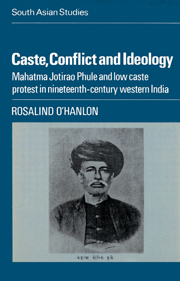 Caste, Conflict and Ideology
Caste, Conflict and Ideology Book contents
- Frontmatter
- Contents
- Acknowledgements
- Notes on translations and area under study, with map
- Part 1 Introduction
- Part 2 Religion and society under early British rule
- Part 3 Jotirao Phule and his circle: the emergence of a distinctive radical voice
- Part 4 The creation of a lower caste identity in history and popular culture, 1869–73
- 7 Ritual status and political conflict in later nineteenth-century Maharashtra
- 8 The Aryan invasions and the origins of caste society
- 9 Warriors and cultivators: the reinterpretation of popular culture
- 10 Maratha history as polemic: low caste ideology and political debate in late nineteenth-century Maharashtra
- Part 5 The lower caste community in contemporary society
- Part 6 Ideology and the non-Brahman movement in the 1880s
- Bibliographic note
- Bibliography
- Glossary
- Index
9 - Warriors and cultivators: the reinterpretation of popular culture
from Part 4 - The creation of a lower caste identity in history and popular culture, 1869–73
Published online by Cambridge University Press: 14 October 2009
- Frontmatter
- Contents
- Acknowledgements
- Notes on translations and area under study, with map
- Part 1 Introduction
- Part 2 Religion and society under early British rule
- Part 3 Jotirao Phule and his circle: the emergence of a distinctive radical voice
- Part 4 The creation of a lower caste identity in history and popular culture, 1869–73
- 7 Ritual status and political conflict in later nineteenth-century Maharashtra
- 8 The Aryan invasions and the origins of caste society
- 9 Warriors and cultivators: the reinterpretation of popular culture
- 10 Maratha history as polemic: low caste ideology and political debate in late nineteenth-century Maharashtra
- Part 5 The lower caste community in contemporary society
- Part 6 Ideology and the non-Brahman movement in the 1880s
- Bibliographic note
- Bibliography
- Glossary
- Index
Summary
Introduction
Phule endowed his ideas about the ancient past with immediate significance by integrating into his account a wealth of practices, beliefs, and symbols from contemporary popular culture and religion. In this way, he hoped to make it possible for potential followers to ‘discover’ a common identity for all lower castes. This identity existed in the midst of familiar institutions and traditions. Its true significance had always been concealed by the mystifications of Brahmanic religion.
The figures which feature most prominently in Phule's account are the god Khandoba, and the good Daitya King Bali of Hindu mythology. In Khandoba, Phule chose one of the central figures of popular religious culture in Maharashtra, the god who was the kuladevata or guardian deity of the Maratha and kunbi group of castes. His chief shrine was (and still is) at Jejuri. He is pictured here as a linga, although as the guardian deity of the Deccan he is more often portrayed as a horseman with a sword in his right hand. He was also worshipped under different names according to his various aspects. The gods Mhasoba, Bahiroba, and Martand were all different names of Khandoba. Likewise they were central figures in the religious and agricultural year of western Maharashtra's largest group of cultivating and peasant castes. Originally, Khandoba was probably a local deity, and has been Sanskritised as an incarnation of Shiva. In a sense, Phule was trying to reverse this process of the Sanskritisation of local deities, and to detach this local religious tradition from its association with the all-India traditions of Hinduism.
- Type
- Chapter
- Information
- Caste, Conflict and IdeologyMahatma Jotirao Phule and Low Caste Protest in Nineteenth-Century Western India, pp. 152 - 163Publisher: Cambridge University PressPrint publication year: 1985


